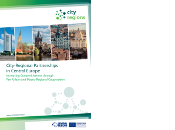Results
The main result of the pilot scheme is a mobility concept, which aims to increase the quality of transport offers. The focus of measures is on public transport, but pedestrian transport and bicycle transport have been analysed, too. Many measures for pedestrians and cyclists are in the planning stage or already in the implementation phase. There is still, however, a need to increase efforts with regard to the implementation of a coherent network of cycling routes.
According to the mobility concept, the system of bus lines offering direct lines to the city of Graz should remain as it is during peak hours. During off-peak hours, however, buses could serve the stations of the suburban railway system, offering change connections with nearly the same travel time. More capacity would become available for services in rural areas, and infrastructure and rolling stock would be used more efficiently. After the approval of proposals, implementation might take effect in 2015.
At the same time, for the region north of Graz a concept for connecting recreation sites through on-demand public transport services has been prepared within the Alpine Space project Rurbance. As part of a larger strategy for urban-rural mobility, both solutions for innovative public transport services might be transferred between the different parts of the Graz urban region.
Pilot action final report (PDF - 5,7 MB)



 After establishing reliable contacts with stakeholders, the possibility to reorganise the offer of public transport in the pilot area was analysed. Spatial and legal conditions, involved stakeholders, financial effects and organisational responsibilities were evaluated.
After establishing reliable contacts with stakeholders, the possibility to reorganise the offer of public transport in the pilot area was analysed. Spatial and legal conditions, involved stakeholders, financial effects and organisational responsibilities were evaluated.
 The region concerned is growing continuously, with a rate of approximately 3 % per year. Many new companies are expected to be founded, and mobility needs of the employees of these companies need to be satisfied.
The region concerned is growing continuously, with a rate of approximately 3 % per year. Many new companies are expected to be founded, and mobility needs of the employees of these companies need to be satisfied.



